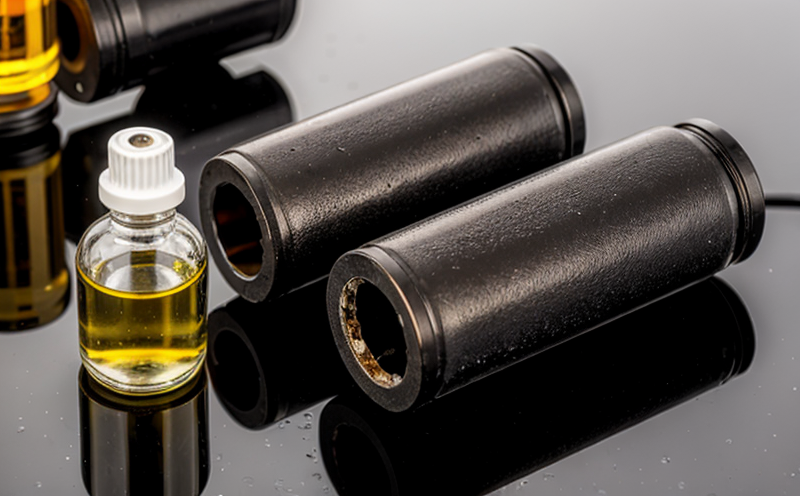ASTM D7678 Gasoline Diesel Jet Fuel Hydrocarbons Test in Water
The ASTM D7678 method provides a standardized procedure for determining the concentration of hydrocarbon compounds present in water samples, including gasoline and diesel jet fuel. This test is crucial for environmental monitoring, ensuring that fuel contamination does not exceed safe levels, thereby protecting aquatic ecosystems.
In this testing process, water samples are collected from various sources such as rivers, lakes, and industrial discharge points. The specimens are then analyzed to measure the total hydrocarbon content as well as specific components like benzene, toluene, ethylbenzene, and xylenes (BTEX). This information is essential for regulatory compliance and for identifying potential sources of contamination.
The ASTM D7678 method uses a combination of gravimetric analysis and gas chromatography. The sample is first prepared by filtering the water through a glass fiber filter to remove particulate matter. The filtered sample is then dried, weighed, and combusted in an oxygen-rich environment at temperatures exceeding 900°C. The combustion products are captured on a silica gel trap, which adsorbs the hydrocarbons.
The captured hydrocarbons are subsequently eluted into a gas chromatograph for analysis. This process allows for precise quantification of the various hydrocarbon compounds present in the sample. The results provide valuable insights into fuel spill incidents and help in assessing the environmental impact of such events.
| Hydrocarbon Component | Chemical Formula |
|---|---|
| Benzene | C6H6 |
| Toluene | C7H8 |
| Ethylbenzene | C9H12 |
| Xylenes (Isomers) | C8H10 (C8H10) |
Preparation and Analysis
The preparation of water samples involves collecting them from the specified locations, ensuring they are representative of the area under investigation. The collected samples are then transported to our laboratory for immediate processing to prevent degradation due to evaporation or biological activity.
The gravimetric analysis portion of the test involves drying and weighing the sample before combustion. This step ensures that any water content is removed, leading to accurate results. Following combustion, the adsorbed hydrocarbons are eluted using a solvent, which is then injected into the gas chromatograph for separation and quantification.
The use of advanced analytical instrumentation such as high-performance liquid chromatography (HPLC) or capillary gas chromatography ensures that even minute traces of hydrocarbons can be detected. This precision is critical in identifying contamination levels and ensuring compliance with environmental regulations.
Upon completion of the analysis, detailed reports are generated, providing a comprehensive overview of the hydrocarbon content in the water sample. These reports include data on individual components as well as total hydrocarbon concentration, along with comparisons to regulatory limits and previous test results.
Why It Matters
The importance of the ASTM D7678 gasoline diesel jet fuel hydrocarbons test in water cannot be overstated. Hydrocarbon contamination can have severe environmental consequences, affecting not only aquatic life but also soil and air quality. By conducting regular testing, industries and regulatory bodies can mitigate these risks effectively.
For instance, oil spills from tankers or pipelines can lead to significant pollution of nearby waters. The ASTM D7678 method helps in quantifying the extent of such contamination, allowing for timely remediation efforts. Similarly, industrial processes that involve the use of gasoline and diesel jet fuel can inadvertently release hydrocarbons into water bodies. Regular testing ensures compliance with environmental standards and reduces potential legal liabilities.
The results of this test are critical for several stakeholders:
- Quality Managers: Ensure product quality by monitoring contamination levels in production processes.
- Compliance Officers: Meet regulatory requirements to avoid penalties and maintain a positive public image.
- R&D Engineers: Develop new products or processes that minimize environmental impact while meeting performance standards.
- Procurement Personnel: Source materials and suppliers who adhere to stringent quality control measures.
In summary, the ASTM D7678 test is an indispensable tool in safeguarding our environment from fuel-related contamination. It provides critical data that informs decision-making processes across various sectors.
Industry Applications
The ASTM D7678 gasoline diesel jet fuel hydrocarbons test finds extensive application in several industries, particularly those involved with water and wastewater management. Here are some key areas where this testing is critical:
- Petroleum Refineries: Monitoring the release of hydrocarbons from storage tanks.
- Shipping Companies: Ensuring compliance with international maritime regulations regarding fuel spills at sea.
- Water Treatment Facilities: Detecting contamination in treated water before it is released into natural water bodies.
- Construction Sites: Assessing the impact of heavy machinery and fuel usage on nearby watersheds.
- Manufacturing Plants: Evaluating emissions from industrial processes that involve the use of hydrocarbon-based fuels.
- Agricultural Operations: Monitoring runoff from areas where diesel-powered equipment is used.
In each of these applications, the ASTM D7678 test plays a pivotal role in ensuring environmental sustainability and regulatory compliance. Its ability to detect even minute traces of hydrocarbons makes it an essential tool for maintaining clean water ecosystems.
Eurolab Advantages
At Eurolab, we offer a comprehensive suite of services tailored specifically to meet the needs of our clients in the field of water and wastewater testing. Our expertise in ASTM D7678 gasoline diesel jet fuel hydrocarbons testing is complemented by state-of-the-art facilities and experienced personnel.
- Accurate Results: Utilizing advanced analytical techniques ensures precise measurement of all target compounds.
- Comprehensive Reporting: Detailed reports provide a thorough analysis, including comparisons to regulatory limits.
- Timely Turnaround: Our efficient workflow allows for quick turnaround times without compromising on quality.
- Regulatory Compliance: Ensuring that all tests comply with international standards such as ASTM D7678 and ISO 14001.
- Expert Personnel: Our team of highly qualified scientists brings extensive experience in environmental testing.
- Custom Solutions: We offer bespoke testing services to meet the unique requirements of our clients.
We pride ourselves on delivering reliable and actionable data that can be used by our clients to make informed decisions. Whether you are a regulatory body, an industrial entity, or an environmental consultant, Eurolab is committed to providing the highest standard of service in ASTM D7678 testing.





